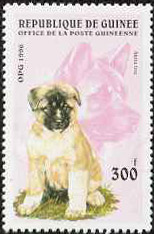
A New Owner's Guide to Rottweilers
Rottweilers are very versatile dogs, which have performed a number of roles, including herding, tracking, hunting, and guarding. They have also been used by police forces, and can perform well in competitive obedience. They pay attention and learn fast but can also learn bad habits very quickly, so their training should be carried out very carefully. They also need extensive and ongoing socialization from puppyhood and right through their lives, because of their guarding tendencies. A well-socialized, well-trained Rottie with a good temperament is a very gentle, stable and trustworthy dog, despite their reputation.
Rotties should always be socialized to be friendly with strangers - this is true for any large dog, but especially true for a dog with guarding instincts that learns fast. Teaching your Rottie to be friendly with strangers won't hamper his ability to be a guard dog. No intruder is going to try to get past a Rottweiler even if he or she appears friendly, and it is difficult to change their ways if Rotties have been taught to show hostility to strangers. You want a dog which will be friendly with people you bring into the home. A Rottweiler is always likely to look serious with uninvited visitors, but it is preferable that he doesn't bite them, since the visitor could be a delivery man or a wandering child.
Training should start with teaching the pup not to playbite people, since teaching bite inhibition is much more difficult with an adult, and a Rottie that bites can do serious damage. It's important to teach the pup house rules while he is small enough to manage easily, because adult Rottweilers are large, strong dogs. They do need exercise and mental stimulation. You could try, for example, sniffer dog games, or teach the dog to retrieve when he is a pup. Rotties do have one characteristic which can be alarming, which is a conversational growl. Normally, a growl is a warning sign, but Rotties will sometimes growl without evil intent. Owners will come to recognize the difference between a conversational and a warning growl, though this can be alarming to someone who does not know the breed, and just knows of their reputation for being aggressive.
Rotties have a reputation for being dog-aggressive, though much depends on the temperament of the individual dog, and on whether socialization with other dogs has been ongoing, starting early. Many Rottweilers are friendly with other dogs, and enjoy playing with them, but you may find that, despite careful socialization, your Rottie dislikes other dogs on walks - especially dogs of the same sex, and if this happens it is prudent to avoid situations where your dog could get into a fight.
Are Rottweilers good with children? This depends. Some Rottweilers are excellent companions for sensible children, enjoying their company and obeying their commands. Much depends on choosing a pup from a line with a nice temperament, on socializing the dog with children from when it is a pup, as well as on training. Rotties are large dogs, so they can knock over small children, and children and dogs always need supervision. It is not a good idea to have neighbourhood children rushing in and out of a garden where a Rottweiler is confined, especially a young Rottie, who could get over-excited and boisterous with a lot of rushing around and screaming going on.
A Rottweiler with a nice temperament is a very rewarding dog for an owner with some idea of how to train dogs, because they learn so fast, and are so versatile. They are not as forgiving of owner mistakes as are, say, Labrador Retrievers, and the breed does have a strong guarding instinct, so they are best taken on by people who already have some experience of dogs. Individuals also vary in terms of temperament, so this is one reason for taking extra care when choosing a pup. Ask the breeder what sort of temperament is being aimed for.
Another reason for selecting pups with care is that the breed can suffer from serious inherited health problems. Common health problems include hip dysplasia, cancer, heart disease, hypothyroidism, bloat, entropion, Von Willebrand's disease, allergies, and spay-related incontinence. This breed doesn't need much grooming, and isn't especially barky.
This is a good introductory guide to Rottweilers, which covers their early history and general care, including nutrition and health care. There is also some help with training.



